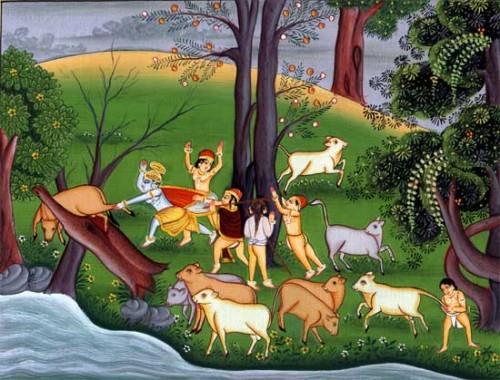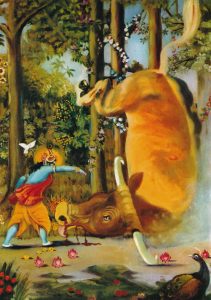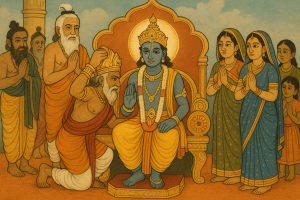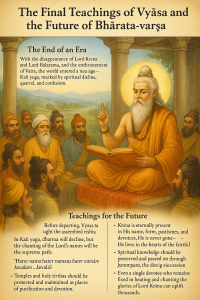The Gokula Pastimes Come to an End
After many wonderful and divine pastimes in Gokula, such as Kṛṣṇa’s butter-stealing adventures, the deliverance of Pūtanā, Tṛṇāvarta, and the uprooting of the yamala-arjuna trees, the village elders became concerned.
They noticed that many dangers had come upon them—rākṣasas disguised as animals, storms, and frightening omens. The cowherd men gathered and decided:
“This place is no longer safe. Let us move to a more secure and prosperous region.”
Nanda Mahārāja, along with the other elders of Vraja, resolved to move the entire settlement to Vṛndāvana, a forest filled with fresh grass, fragrant flowers, sweet Yamunā water, and protective hills. They believed this new land would be free from disturbances and better for the cows and children.
The Departure for Vṛndāvana
The entire village of Gokula packed their belongings—pots, household items, sacred images, and provisions. The gopas yoked their bullock carts, and the gopīs climbed aboard with their children. Some led cows; others carried milk pots or musical instruments.
At the heart of the procession were Yaśodā and Nanda Mahārāja, with Kṛṣṇa and Balarāma seated upon soft cushions. The entire caravan moved slowly, like a grand festival on the move, with joyful songs and the jingling of anklets and bells.
As they entered Vṛndāvana, they were enchanted by the beauty—groves of flowering trees, bees humming melodies, peacocks dancing, and deer gazing in wonder at the newcomers.
New Life in Vṛndāvana
The gopas quickly built new homes with thatched roofs and wooden frames. The cows roamed freely in the meadows, grazing on green grass and drinking from Yamunā. The gopīs began tending the new kitchens and cowsheds, and the children began to play under the shady trees.
Kṛṣṇa and Balarāma now started herding the calves, bringing immense joy to their parents and the entire village.
Vatsāsura Appears in Disguise
One day, while herding the calves in the forest, Kṛṣṇa noticed something unusual. A calf was moving oddly—he was not grazing, not looking at the other calves, and his eyes burned with a strange glow.
Kṛṣṇa, the all-knowing Lord, immediately understood:
“This is no ordinary calf. It is Vatsāsura, a demon sent by Kaṁsa to kill Me and My brother.”
Vatsāsura had taken the form of a calf to mix with Kṛṣṇa’s herd, hoping to catch the Lord off guard and kill Him when alone.
Kṛṣṇa’s Effortless Victory
Kṛṣṇa approached the demon-calf with a smile on His lips and a glint in His lotus eyes. Pretending to be innocent, He suddenly grabbed Vatsāsura by the legs, whirled him around with tremendous force, and smashed him against a tree, killing him instantly.
The demon returned to his original terrifying form and fell lifeless. At that very moment, celestial beings appeared in the sky, showering flowers and praising the Lord’s pastime.
The cowherd boys, unaware of the true danger, clapped and cheered, thinking it was part of the day’s fun.
Simple Joy in the Forest
Afterward, the boys and Kṛṣṇa gathered beneath a kadamba tree, sharing snacks and stories. They laughed, sang songs, and made garlands of flowers for each other.
Though He was the Supreme Lord, Kṛṣṇa delighted in these simple, loving exchanges with His friends. To them, He was not God—He was their dearest friend, their playmate, their very life.
Lessons to Be Learned:
- Even a simple change in life’s setting, like moving to Vṛndāvana, can be divinely orchestrated to enhance bhakti and rasa.
- The Lord always protects His devotees, often without them even knowing the danger.
- Demons may disguise themselves, but the Lord is never deceived.
- The forest of Vṛndāvana is not ordinary—it is filled with eternal, joyful pastimes of the Lord.
- Friendship with the Lord, even in the form of play, is the highest perfection, accessible only to the pure-hearted.
Origin of the Story: Harivaṁśa Purāṇa – Viṣṇu-parva, Chapters 21–24



